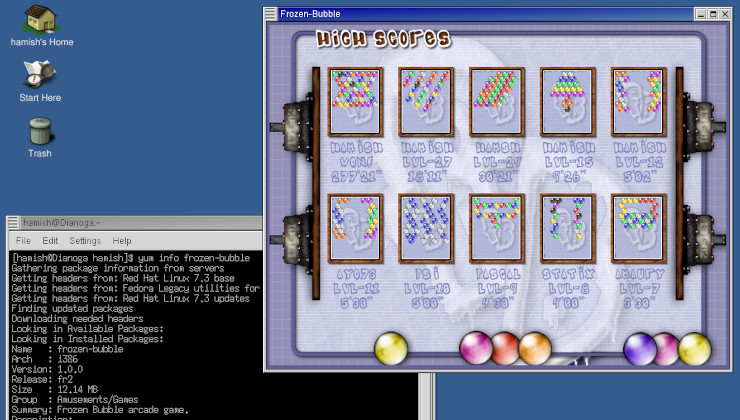Hello, Linux Gamers! We are still around and we have a special episode in store for you!
A little reason for the delay on this particular episode: I had planned a trip to my home state back at the beginning of this month, when an opportunity came up. I found out that none other than The Linux Gamer from YouTube lived in the area.
So we arranged for the recording of this podcast to happen face to face, something of a rarity in our very digital age. So the topic we came to discuss was about Steam Machines and we ask the question: how should they be viewed, as a console or PC? So sit back and enjoy, while we talk about gaming on Linux.
You can also see the video portion on The Linux Gamer video.
MP3
Download
OGG
Download
RSS Links
MP3 RSS
OGG RSS
Note: Article edited by Liam. There seems to be some minor buzzing here and there for a second or two, but it goes as quickly as it comes.
A little reason for the delay on this particular episode: I had planned a trip to my home state back at the beginning of this month, when an opportunity came up. I found out that none other than The Linux Gamer from YouTube lived in the area.
So we arranged for the recording of this podcast to happen face to face, something of a rarity in our very digital age. So the topic we came to discuss was about Steam Machines and we ask the question: how should they be viewed, as a console or PC? So sit back and enjoy, while we talk about gaming on Linux.
You can also see the video portion on The Linux Gamer video.
MP3
Download
OGG
Download
RSS Links
MP3 RSS
OGG RSS
Note: Article edited by Liam. There seems to be some minor buzzing here and there for a second or two, but it goes as quickly as it comes.
Some you may have missed, popular articles from the last month:
All posts need to follow our rules. For users logged in: please hit the Report Flag icon on any post that breaks the rules or contains illegal / harmful content. Guest readers can email us for any issues.




 How to set, change and reset your SteamOS / Steam Deck desktop sudo password
How to set, change and reset your SteamOS / Steam Deck desktop sudo password How to set up Decky Loader on Steam Deck / SteamOS for easy plugins
How to set up Decky Loader on Steam Deck / SteamOS for easy plugins
Yeah he is really an awesome guy :D I like his approach he is like F*** performance as long as I can play on linux :D I have kind of the same approach but still it is a pleasure to see games that are well optimized!
Valve makes a standard Steam Machine, Valve-branded but manufactured through a partner, for $500, down to $400 or less over the course of that generation*.
Valve is also going heavy on VR. Have generations of Steam Machines correlate to SteamVR hardware generations*(may be 2-3 year intervals)
Oculus recently released Asynchronous Space Warp(ASW), a technique that allows games to run at 45 fps but smooth out to 90 fps, without drastically reducing the experience. Valve will eventually copy this functionality in SteamVR. Use this ability to have the $500 Valve Steam Machine run VR at acceptable performance.
The Vive is currently $800, so either that headset or another future SteamVR headset is released at $500, to be more price-palatable for the console market.
Valve also makes a higher-tier configuration for each generation of Steam Machine, adds on say $200 for better CPU & GPU, to allow for a VR experience that doesn't rely on ASW, as well as higher settings in regular games.
-----
2017 Valve Steam Machine Standard ($500), 2017 Valve Steam Machine Premium ($700).
2020 Valve Steam Machine Standard ($500), 2020 Valve Steam Machine Premium ($700), etc etc.
-----
Valve continues to invest money in debugging tools, Vulkan, and whatever else that will make SteamOS/Linux development more palatable to developers.
So, I've got a lot of thinkies going on here, and probably enough to merit a big article with proper organization and details. tl;dr: maybe culture clash, maybe no roadmap whatsoever. The key things are:
1. Valve employees work on whatever they want to work on. In addition, some employees get hired for a specific thing and fired right after its done. No one wants to move their desks to the Linux part, and/or people working on SteamOS were fired.
2. As such, little has been done. They talk a lot about the living room experience, but BPM is incredibly bare-bones, in addition to the regular deficiencies of the Steam client. Where's Netflix? Where's reliable and easy party chat? (Valve for whatever reason added movie rentals to Steam. I have no idea why.) Get these kind of quality of life apps developed with nice APIs available for them.
3. As a result of these two things, the only things happening to SteamOS are basically syncing with upstream Debian and Steam packages. BPM is also moving at a glacial pace, when its loaded with bugs. (Valve HAS been working on VR on Linux though, and that is major though.)
4a. SteamOS basically was a response to what turned out to be a bluff - Microsoft going full App Store with Windows 8. This didn't happen, and Gabe's paranoia was defused. Except now Microsoft is pushing their own store again, albeit they maintain (and for the enterprise market, it must be) it is an open platform. Steamworks works in appx containers for Win32, and they're actively fixing issues with UWP. And now Microsoft is actively pushing Xbox Live interoperability on Windows, like joining parties and even games. Now they actually HAVE cross-buy with Xbox and Windows, which they announced with their big Surface reveal. And even then, if Microsoft did start closing it, who is to say they wouldn't get developers and publishers to follow?
4b. Maybe Steam Machines were just a front to get games ported to desktop Linux, and Valve had no intent of supporting it. Food for thought.
5a. I think your remarks on PCification/Consolification are a bit off. Consoles do a lot of stuff because people expect them too - they've become digital hubs of the HTPC kind. (I won't get into the specifics of the difference between Microsoft and Sony's strategy, and then the tablet aspect of Nintendo's.) Anyways, even with the added complexity that consoles have taken as a result of it, they're still easy to use plug and play appliance with no worries over compatibility. (Though I worry over the mid-life upgrades they're adding, that is, PS4 Pro and Scorpio.) The architecture doesn't matter, the consoles offer the experience, games, and now the social network.
5b. Steam Machines bring the complexity of PC gaming to consoles - you have to worry about specifications, mid-life part upgrades, compatibility, lifecycles, etc. In addition, the OEMs have little interest in promoting the platform. (Oddly, Dell seems to be the only one interested in pushing it - they put more effort in than Valve at times.) I don't care about openness in an appliance (sorry GNU people, you know it to be true) - I want it to work well. If I have to fight Gnome Shell, OBS, and Mumble with a controller, or fiddle with config files, then that's a terrible living room experience. Otherwise, if I could cope with this, I could build a PC and get flexibility instead.
5c. And that's what I think Valve needs to realize - the strengths of the Steam Machines. Design and make (contract out manufacture to HTC - works for Google and Valve) your own box, maybe cut out the OEMs, (simplify choice, avoid brand dilution) and put effort into making a smooth way to experience PC gaming. Fix the problems, subsidize prices down so they're comparable to the big 3, advertise it, and get games onto the platform. I know Valve have good industrial design chops, as seen with their controller. You need one or two boxes maximum, with long lifecycles. If I have to refer to a spec sheet to wonder if the game works, you fail it. You don't have to lock it tight, (let people have SSH on it, or keep the Gnome session, but you shouldn't be expected to use it. maybe upgradeable HW?) but if you want openness as a priority, then you can get a PC. If you want a no-hassle way to get games from Fallout (port that) to Europa Universalis (not available on consoles) to CS:GO. (only available in a crippled form) Complexity only comes as you need it, not forced onto you as part of the platform.
6. I wonder if there's a fundamental culture clash. PC gamers don't like console gaming and don't see their strengths, and vice versa. I think it's possible for there to be a balance - I'd love a "just works" box that plays PC games I can't get (or can't get cheaply) elsewhere, but as of right now, Steam Machines take the worst of both worlds. There's also the issue that Valve's organizational structure is poorly suited to support and push a platform. It's a miracle Steam runs as it does.
I don't completely agree with you, I love big picture mode, it makes browsing through my library easy from couch, controller support is great on steam, VR is becoming a thing on Linux too so I cannot agree that any console can even compare to the bonuses that BPM and SteamOS can have... for example not buying same games over and over again, even when upgrading hardware...
Imagine if they provided some sort of APIs to make in-steam apps like twitch, netflix, youtube... that would make experience even nicer, this would literally crush every concurrence they have in the Living room potential. After that they should just push it out loud and make contracts with game developers for great titles... also maybe providing a streaming feature right off the BPM.
If they do things right they have a whole bunch of potential with SteamOS, Steam machines and also on desktop Linux/Windows gaming market... If they market Steam machines well and SteamOS they might actually gain in the popularity to the point where Linux desktop marketshare wouldn't matter that much because a lot of people would still be playing on Steam machines.
EDIT: Oh and I think that Valve is the first company that might be able to bring 60fps 4K gameplay support to consoles because if manufacturers have already made laptops with gtx 1080 SLIs, it could be easy to make something like that for console-like steam machines. And that is actually a huge deal, I cannot stand the lack of responsivnes and fps on my cousin's PS4
Last edited by MaCroX95 on 30 Oct 2016 at 1:37 pm UTC
1b. The line between PC and console is blurry with Steam Machines, and it's not clear where it belongs. Maybe upgradeability in some respects is worth having, but then you shift the burden onto the user, fiscally and mentally. With a console, you're basically guaranteed 5-7 years of games in the lifecycle. With a PC, you have no such guarantees, and you'll need to upgrade in a way that makes sense fiscally and in compatibility, and this is on the user. I think the point of Steam Machines is to have an option that lets you skip past the complexity and experience PC games for a great price. (But maybe PC games aren't amenable to this - you can easily shoot yourself in the foot with improper graphics settings, especially if they didn't auto-configure, and mods, after all.)
2. I also definitely agree they need to get things like Twitch and Netflix into BPM. There's a lot of things where you can see the seeds for greater integration with other things. Why not Spotify instead of the built-in Steam music player? Why not Twitch streaming in Steam broadcasting? Why not Mumble instead of Steam's neglected voice chat? This should all be easily placed where the existing modules are, and easily usable with BPM. But it's all so half-baked.
3. I think Valve lacks the internal discipline and unity to push Steam Machines/OS as a platform, so all you're left with are OEMs who had to delay the launch by a year see low sales numbers. They have no interest in the success of the platform, only Valve does. But Valve doesn't either.
4. VR? In my console? It's more likely than you think. PSVR came out, and it's apparently pretty good for the price. Xbox One "Scorpio," the mid-life upgrade, will offer Vive and Oculus support, and again in Microsoft's last hardware event, they're pushing Windows on a variety of OEM-provided AR/VR/MR headsets. Valve would want to be careful if they want to be in charge of, let alone have a say, in this new VR world. (I myself don't really care much about VR...)
2a. Steam Machines need simple options, otherwise, choice paralysis kicks in. Have you seen the options on the hardware section, especially before it was pruned down by OEMs pulling out? How, as a consumer, could you compare all those options, and determine what was compatible with what you wanted, let alone the value of the machines? Again, if you want choices, you could have bought a PC.
2b. A problem is now you need to guarantee that games will be compatible for the machine, and automatically pick the right graphical configuration. For the sake of simplicity in this argument, we don't care that the user can change them, either to fix them or "break" (go out of bounds of reason) them. Now you need to put this overhead on all titles for whatever range of machines you have, and probably for older games as well. If you have more than one specification level, then you need some way to distinguish between then, and that needs to be simple as possible while carrying the nuance. This is solvable, but hard, yet necessary if you want the appliance factor.
3. Of course drivers need to improve. But if you're suggesting users should drop to the shell to fix issues there, then you lose the appliance factor.